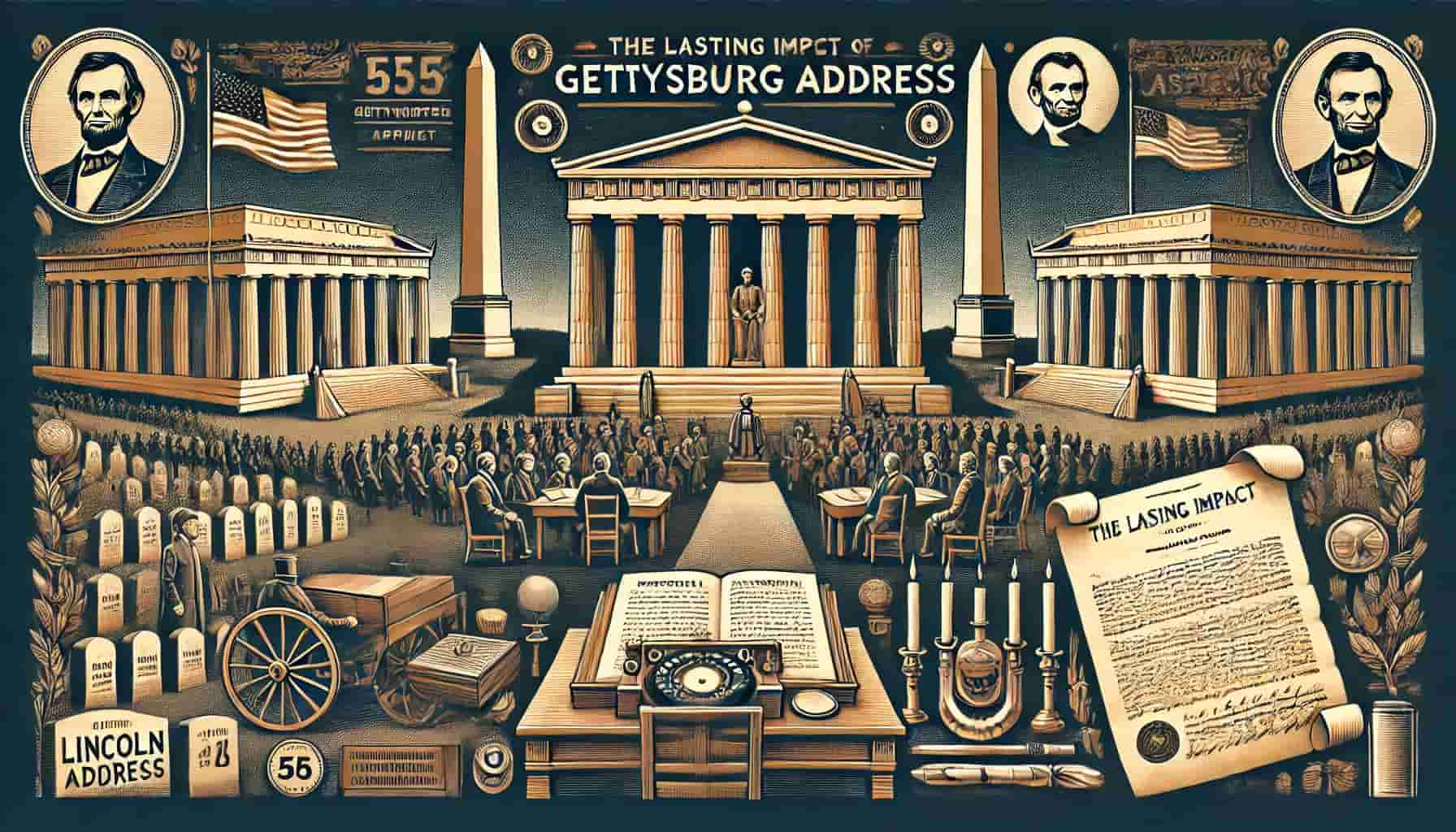Lincoln's Gettysburg Address
The theme of this English language resource is "learning casual English through real events."
The theme of this English resource is "Learn casual English through real events."
Abraham Lincoln's Gettysburg Address, delivered on November 19, 1863, is one of the most iconic speeches in American history. In this blog, we will explore Lincoln's Gettysburg Address and enhance our English skills by learning American idioms along the way. Abraham Lincoln's Gettysburg Address, delivered on November 19, 1863, is one of the most iconic speeches in American history. In this blog, we will discuss Lincoln's Gettysburg Address and enhance our English skills by learning American idioms along the way.
Section 1: The Background of the Gettysburg Address

The Gettysburg Address is remembered as a pivotal turning point during the American Civil War. In this brief yet powerful speech, Lincoln painted a vision for America's future as a "nation of freedom. "nation of freedom."
The idiom "turn the tide". This idiom means to dramatically change or reverse the course of events, which is exactly what the Battle of Gettysburg was exactly what the Battle of Gettysburg did for the Civil War.
Questions and Answers
Q1: Why is the Gettysburg Address considered important?
- A: A The Gettysburg Address is important because it emphasized the values of equality and unity, reaffirming the purpose of the Civil War.
Q2: What message did Lincoln want to convey in this speech?
- A: A He conveyed the message that "government of the people, by the people, for the people" should prevail.
Q3: How is the expression "turn the tide" used in this context?
- A: A It is used to describe how the Battle of Gettysburg was a crucial moment that changed the course of the Civil War.
Now, let's talk using idioms.
Let the students choose one favorite idiom and make an example sentence.
Idiom Explanation
Idiom: "Turn the tide"
- Explanation:. This idiom means "to dramatically change the situation." The Battle of Gettysburg was a significant event that turned the The Battle of Gettysburg was a significant event that turned the
- Example: The The brilliant strategy helped the army turn the tide of the battle.
Section 1: Background to the Gettysburg Address
The Gettysburg Address is remembered as an important turning point during the Civil War. In this speech, Abraham Lincoln emphasized the value of equality and reminded the nation of the significance of the battle. In this short, but powerful speech, Lincoln presented the future of America as the "land of the free."
"Turn the tide". idiom is a perfect fit for this background. This idiom means to dramatically change or reverse a situation and is used to refer to Gettysburg as a pivotal point in the Civil War that turned the tide of the battle.
Questions and Answers
Q1: Why is the Gettysburg Address considered important?
- A: A The Gettysburg Address was a great success because it emphasized the value of equality and the unity of the nation and reaffirmed the purpose of the Civil War.
Q2: What message did Lincoln want to convey in this speech?
- A: A He delivered the message that government is for the people and should be established by the people.
Q3: How is the expression "turn the tide" used in this context?
- A: A This is because the Battle of Gettysburg was a pivotal moment that changed the course of the Civil War.
Idioms Explained
Idiom: "Turn the tide"
- Commentary:. This idiom means "to change a situation dramatically." The Battle of Gettysburg in the Civil War was an important event that changed the course of the war.
- (Japanese translation: With its brilliant strategy, the army was able to turn the tide of the battle.)Example Sentences:. The brilliant strategy helped the army turn the tide of the battle.
Section 2: The Content and Message of the Speech

Lincoln's Gettysburg Address consists of only 272 words, yet it is incredibly moving. With the famous phrase "government of the people, by the people, for the people," he reminded many of the values of freedom and equality.
Here, let's use the idiom "make a lasting impression".. This phrase means "to leave a strong impact," and it perfectly describes the effect Lincoln's speech had on people.
Questions and Answers
Q1: What is the most famous part of the Gettysburg Address?
- A: A The phrase "government of the people, by the people, for the people."
Q2: Why is this speech so impressive despite its brevity?
- A: A Because it uses simple yet powerful language that deeply moved the audience.
Q3: How is "making a lasting impression" relevant here?
- A: A The speech left a strong impression on people's hearts, reaffirming American values.
Now, let's talk using idioms.
Let the students choose one favorite idiom and make an example sentence.
Idiom Explanation
Idiom: "Make a lasting impression"
- Explanation:. This idiom means "to leave a strong impact." Although Lincoln's speech was very short and concise, it left a deep impression on many people. impression on many people.
- Example: The Her performance in the play made a lasting impression on everyone who watched it.
Section 2: Speech Content and Message
Lincoln's Gettysburg Address consists of only 272 words, but is extremely moving despite its brevity. With his famous phrase "government of the people, by the people, for the people," he reminded many people of the value of freedom and equality.
WHEREAS,"Make a lasting impression". Use the idiom "the speech was a great success. This phrase means "to leave a strong impression" and is a good way to describe the impact Lincoln's speech had on people.
Questions and Answers
Q1: What is the most famous part of the Gettysburg Address?
- A: A The phrase is "government of the people, by the people, for the people."
Q2: Why is this speech so impressive despite its short length?
- A: A The reason is that he used simple, powerful language that deeply impressed his audience.
Q3: How is "Make a lasting impression" relevant?
- A: A This is because the speech left a strong impression on people's minds and reaffirmed American values.
Idioms (H4)
Idiom: "Make a lasting impression."
- Commentary:. The idiom means "to leave a strong impression. Lincoln's speech was very short and concise, but it left a deep impression on many people.
- (Her performance left a strong impression on all who saw it.)Example Sentences:. Her performance in the play made a lasting impression on everyone who watched it.
Section 3: The Impact of the Speech and Its Legacy

After the Gettysburg Address, America united to continue fighting for the values of democracy and freedom. This speech continues to have a profound influence even today, inspiring many with Lincoln's words.
The idiom "stand the test of time". This phrase means "to endure over time," and it perfectly expresses how Lincoln's speech This phrase means "to endure over time," and it perfectly expresses how Lincoln's speech has maintained its value across generations.
Questions and Answers
Q1: Do you think the Gettysburg Address still has an impact today?
- A: A Yes, the speech emphasizes the values of democracy, and it continues to influence many people.
Q2: How is the expression "stand the test of time" related to this speech?
- A: A Lincoln's words have remained influential for generations, truly standing the test of time.
Q3: Are there any other historical speeches that have inspired you?
- A: A Martin Luther King's "I Have a Dream" speech was also very inspiring.
Now, let's talk using idioms.
Let the students choose one favorite idiom and make an example sentence.
Idiom Explanation
Idiom: "Stand the test of time"
- Explanation:. This idiom means "to endure over time." Lincoln's Gettysburg Address has maintained its value and influence for generations. Lincoln's Gettysburg Address has maintained its value and influence for generations.
- Example: The The ancient pyramids have stood the test of time, attracting visitors from all over the world.
Section 3: Impact of the Speech and Beyond
After the Gettysburg Address, the United States continued to unite and fight for the values of democracy and freedom. The speech continues to have a profound impact on future generations. Lincoln's words continue to inspire many to this day.
The idiom used here is,"Stand the test of time". It is. The phrase "stands the test of time" is a perfect description of the value that Lincoln's speech has maintained over generations.
Questions and Answers
Q1: Do you think the influence of the Gettysburg Address continues today?
- A: A Yes, this speech emphasized the value of democracy and still influences many people today.
Q2: How does the expression "stand the test of time" relate to this speech?
- A: A Lincoln's words have remained influential for generations and have truly "stood the test of time."
Q3: Are there any other historical speeches that have impressed you?
- A: A Martin Luther King's "I Have a Dream" speech was also very moving.
Idioms Explained
Idiom: "Stand the test of time."
- Commentary:. This idiom means "to stand the test of time." Lincoln's Gettysburg Address has held value and influence for generations.
- (Japanese translation: Ancient pyramids have stood the test of time, attracting visitors from all over the world.)
Example Sentences:. The ancient pyramids have stood the test of time, attracting visitors from all over the world.



Disclaimer:
This English language material is based on content generated using ChatGPT with modifications. While every care has been taken to ensure the accuracy of the information, it may contain errors. We are not responsible for any damages caused by the use of this material.


